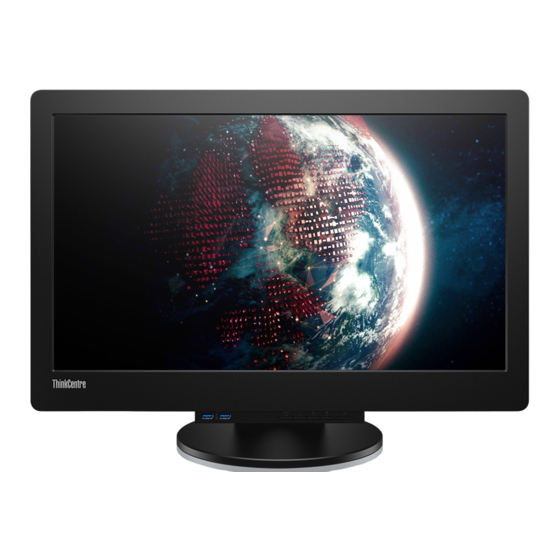- ページ 18
デスクトップ Lenovo ThinkCentre Tiny-in-One 23のPDF ユーザーマニュアルをオンラインで閲覧またはダウンロードできます。Lenovo ThinkCentre Tiny-in-One 23 45 ページ。

Installing the monitor driver
To enjoy a better monitor performance, it is recommended that you install the monitor driver before using the
monitor.
To install the monitor driver, do one of the following:
If the optical drive is available, insert the CD that comes with the monitor into the optical drive. Then, follow the
instructions on the screen.
If the optical drive is not available, download the driver from the Lenovo Web site at
http://support.lenovo.com/docs/10DQD. Then, follow the instructions in "Manually installing the monitor
29
driver" on page
.
Comfort and accessibility
Good ergonomic practice is important to get the most from your personal computer and to avoid discomfort.
Arrange your workplace and the equipment you use to suit your individual needs and the kind of work that you
perform. In addition, use healthy work habits to maximize your performance and comfort while using your
computer.
Arranging your work area
Use a work surface of appropriate height and available working area to allow you to work in comfort.
Organize you work area to match the way you use materials and equipment. Keep your work area clean and clear for the
materials that you typically use and place the items that you use most frequently, such as the computer mouse or
telephone, within the easiest reach.
Equipment layout and setup play a large role in your working posture. The following topics describe how to optimize
equipment setup to achieve and maintain good working posture.
Positioning and viewing your monitor:
●
Position and adjust your computer monitor for comfortable viewing by considering the following items:
● Viewing distance:
Optimal viewing distances for monitors range from approximately 510mm to 760mm (20 in to 30 in) and can vary
depending on ambient light and time of day. You can achieve different viewing distances by repositioning your
monitor or by modifying your posture or chair position. Use a viewing distance that is most comfortable for you.
● Monitor height:
Position the monitor so your head and neck are in a comfortable and neutral (vertical, or upright) position. If your
monitor does not have height adjustments, you might have to place books or other sturdy objects under the base of
the monitor to achieve the desired height. A general guideline is to position the monitor such that the top of the
screen is at or slightly below your eye-height when you are comfortably seated. However, be sure to optimize your
monitor height so the line of site between your eyes and the center the monitor suits your preferences for visual
distance and comfortable viewing when your eye muscles are in a relaxed stated.
● Tilt :
Adjust the tilt of your monitor to optimize the appearance of the screen content and to accommodate your
preferred head and neck posture.
● General location:
Position your monitor to avoid glare or reflections on the screen from overhead lighting or nearby windows.
The following are some other tips for comfortable viewing of your monitor:
● Use adequate lighting for the type of work you are performing.
● Use the monitor brightness, contrast, and image adjustment controls, if equipped, to optimize the image on
your screen to meet your visual preferences.
● Keep your monitor screen clean so you can focus on the screen's contents.
Any concentrated and sustained visual activity can be tiring for your eyes. Be sure to periodically look away from
your monitor screen and focus on a far object to allow your eye muscles to relax. If you have questions on eye
fatigue or visual discomfort, consult a vision care specialist for advice.
Chapter 2 Adjusting and using your monitor
13
